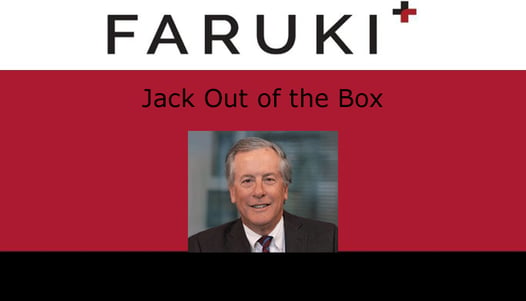- February 12, 2025
- Jack Greiner
- Jack Out of the Box
 Late last year, the Ohio Supreme Court, in an order written by Chief Justice Sharon Kennedy, confirmed that the right to record and photograph trial court proceedings is not the exclusive right of legacy media. Recognizing the current landscape, the Court affirmed that non-traditional media outlets are entitled to record proceedings too.
Late last year, the Ohio Supreme Court, in an order written by Chief Justice Sharon Kennedy, confirmed that the right to record and photograph trial court proceedings is not the exclusive right of legacy media. Recognizing the current landscape, the Court affirmed that non-traditional media outlets are entitled to record proceedings too.
The ruling came about indirectly. A criminal defendant named Cody Henderson filed an affidavit of disqualification seeking to disqualify Judge Susan R. Wollscheid of the Washington Court House Municipal Court from presiding over his case.
From reading the Court's statement of facts, it appears Henderson was representing himself in the proceedings, and succeeded primarily in getting on the judge's nerves. The judge did not take kindly to Henderson's insistence on exercising certain constitutional rights, including his right to a speedy trial. The Judge pressed him to waive that right to no avail. The Judge also appointed counsel for Henderson over his objection.
In response, Henderson filed an affidavit of disqualification with the Ohio Supreme Court. A litigant may file such an affidavit against a judge of a municipal or county court if the judge "has a bias or prejudice for or against a party to a proceeding pending before the judge or to a party's counsel, or allegedly otherwise is disqualified to preside in a proceeding pending before the judge."
In addition to the evidence regarding the speedy trial waiver and the appointment of counsel, Henderson pointed to the Judge's denying permission to "Omniversal Media" to video record the proceedings. According to Henderson, this type of broadcasting is "necessary for an open society of transparency, and the administration of fair and public trials."
In considering this part of the affidavit, Chief Justice Kennedy pointed to the Open Courts section of the Ohio Constitution, the First Amendment's Free Speech guarantee, and the Sixth Amendment's right to a fair trial, noting that each of these guarantees support the public's right to attend and record court proceedings. She further noted the mandatory language contained in Rule 12 of the Ohio Rules of Superintendence, which states "[t]he judge assigned to the trial or hearing shall permit the broadcasting or recording by electronic means and the taking of photographs in court proceedings that are open to the public as provided by Ohio law." Courts don't have discretion to ban recording.
In Henderson's case, the Judge said she banned Omniversal Media because she "did not believe [it] to be a legitimate request." She based that decision on her unfamiliarity with the media outlet, on the media outlet's not being local, and on the company's being just a "Youtuber." She claimed that she also denied the request to avoid giving Henderson an audience for what she characterized as disruptive behavior.
But these reasons didn't satisfy Chief Justice Kennedy. She ruled that "the press also includes citizen journalists who use technology for mass communication. . . . Citizen journalists—which Henderson has proclaimed himself to be— include bloggers, Xers, Facebookers, YouTubers, Instagrammers, and others who use media that allow citizens to speak and express their views and opinions. All of these can be considered members of the press who enjoy the right to gather the news and the right to publish it—after all, '[t]he protected right to publish the news would be of little value in the absence of sources from which to obtain it.'"
The Chief Justice went on: "[Superintendent Rule] 12 upholds these principles, and it does not authorize judges to decide for themselves who has a legitimate voice and who does not have a legitimate voice. Nor does it allow a judge to deny media access to broadcast criminal proceedings solely to avoid giving the accused an audience—drawing an audience is the whole point of the press."
In short, "the media" – legacy and citizen journalists – are entitled to record court proceedings, not just because it's a good idea, but because the governing rule says so.
The Supreme Court did disqualify Judge Wollscheid from Henderson's case. Given how much he seemed to annoy her, I'm not sure she's all that disappointed.
